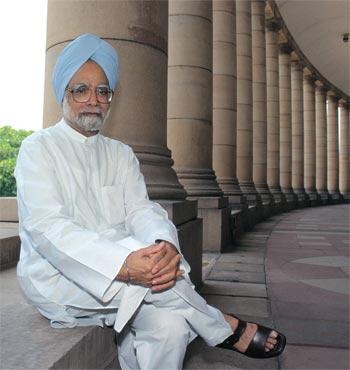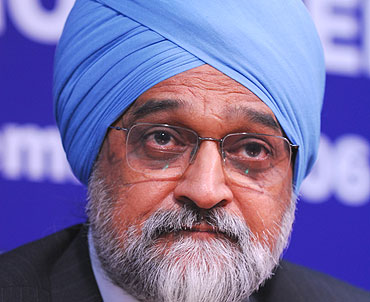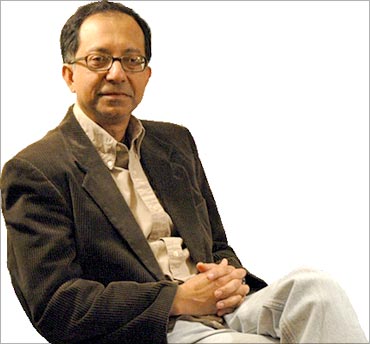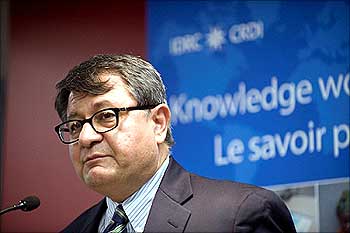 | « Back to article | Print this article |
10 economic experts who advise the prime minister
Inflation is touching a double-digit figure; interest rates are rising; petrol prices are going up -- and there is no knowing to what extent would they keep rising.
This is bound to push the prices of everything from spinach to penthouses; and now there is talk of increasing the prices of cooking gas cylinders as well, although after extreme pressure that was brought to bear upon the ruling UPA government by its allies and opponents, the decision to cut subsidy for cylinders beyond four a year has been postponed.
The Reserve Bank of India raised key interest rates by 25 basis points on Friday, the 12th time it has done since March 2010. State-owned oil companies on Thursday raised petrol prices by Rs 3.14 per litre as a fall in rupee increased the cost of importing crude oil.
The government meanwhile denied that it had increased the petrol prices and put the blame at the oil PSUs' doorstep. At a time when the UPA government is grappling with various issues -- price rise, corruption, terrorism, economic slowdown -- the economic decisions it is taking would appear strange as they are putting a bigger burden on the common man than ever before.
Every time the RBI raised interest rates, the reason given was that since inflation is high, higher interest rates would suck the excess money out of the economy thereby leading to a drop in prices. That experiment has been carried out 12 times in the last year and a half without any visible signs of prices coming down.
So who advises the government when it comes to economic policy? Or is it the political compulsions that have made the government take some of these decisions that are distancing it further from the common man?
Click NEXT to read more...
10 economic experts who advise the prime minister
The food inflation for the week ending September 3, 2011, stood at 9.47 per cent. The wholesale price index, a representation for inflation, for the month of August 2011, stood at a 9.78 per cent, well above RBI's target of 7 per cent.
The RBI says it is forced to raise interest rate as inflation continues to inch toward the double-digit figure. Oil companies claim they have no option but to increase petrol prices as they are suffering huge losses due to fall in rupee value and subsidy.
Click NEXT to read more...
10 economic experts who advise the Indian prime minister
Prime Minister Manmohan Singh has come under criticism from all sides, justifiably so considering that he is leading the country, but is he the only one making these decisions?
Far from it. There is a whole team advising and guiding him.
So, let us have a look at some of these players.
Click NEXT to see the 10 key members...
10 economic experts who advise the Indian prime minister
1. Pranab Mukherjee
Finance Minister
Mukherjee is a senior member of the Cabinet Committees on Economic Affairs, Infrastructure, Parliamentary Affairs, Political Affairs, Prices, Security, Unique Identification Authority of India and World Trade Organization.
He is also a member of the Congress Working Committee, the highest decision-making body of the Indian National Congress.
He holds MA degrees in History and Political Science and a degree in law from the University of Calcutta.
Click NEXT to read more...
10 wise men leading the prime minister
2. Duvvuri Subbarao
Governor, Reserve Bank of India
He is a 1972 batch Indian Administrative Service officer of Andhra Pradesh cadre.
He did his schooling from the Sainik School in Korukonda, Andhra Pradesh, graduated in Physics BSc from Indian Institute of Technology Kharagpur and received an MSc degree in Physics from Indian Institute of Technology Kanpur.
Subbarao topped the IAS examination in 1972 and was assigned the Andhra Pradesh cadre.
He later did a Masters degree in economics from Ohio State University, and was a Humphrey Fellow at Massachusetts Institute of Technology.
Although the RBI governor works autonomously, his role in shaping the country's economic policies cannot be overstated.
Click NEXT to read on . . .
10 economic experts who advise the Indian prime minister
Chairman, Prime Minister's Economic Advisory Council
He is an economist and a distinguished former Member of Parliament and Governor of the Reserve Bank of India.
He is also the Chairman of the Madras School of Economics and the Founding Chairman of the CR Rao Advanced Institute of Mathematics, Statistics and Computer Science.
Rangarajan graduated from Loyola College of the University of Madras in the commerce stream (where he was a contemporary of the Yale University economics professor T N Srinivasan).
He later took PhD in economics from the University of Pennsylvania in 1964.
Click NEXT to read more...
10 economic experts who advise the Indian prime minister
Deputy Chairman, Planning Commission.
He has been a key figure in India's economic reforms from the mid 1980s onwards.
He joined the government in 1979 as Economic Advisor in the Ministry of Finance after which he held a series of positions, including Special Secretary to the Prime Minister; Commerce Secretary; Secretary in the Department of Economic Affairs; Finance Secretary in the Ministry of Finance; Member of the Planning Commission and Member of the Economic Advisory Council to the Prime Minister.
He studied at St Patrick's High School, Secunderabad, Delhi Public School, Mathura Road, and Bishop Cotton School Shimla, then graduated with a BA (Hons) degree from St Stephen's College, University of Delhi.
He received the BA(Hons) degree as a Rhodes scholar from the University of Oxford having studied at Magdalen College, Oxford.
He also studied for a BPhil in Economics at Oxford University, which the university later reclassified as an MPhil.
While at Oxford, he was the president of the Oxford Union.
Click NEXT to read more...
10 economic experts who advise the Indian prime minister
Chief Economic Advisor, Finance Ministry
He is also the C Marks Professor of International Studies and Professor of Economics and, until recently, Chairman of the Department of Economics and Director, Center for Analytic Economics at Cornell University.
Basu did his schooling at St. Xavier's Collegiate School, Kolkata. In 1969, he moved to Delhi to do his undergraduate studies in Economics (Honors), with Mathematics as subsidiary, from St Stephen's College.
He then went on to the London School of Economics, to do his MSc in Economics. After completing his MSc in 1974, he stayed on at the London School for his PhD, from 1974 to 1976. He did his PhD on choice theory under the chairmanship of Amartya Sen.
Click NEXT to read more...
10 economic experts who advise the Indian prime minister
Member, Prime Minister's Economic Advisory Council
He is the Director of National Institute of Public Finance and Policy, New Delhi, and his past positions include Director, Institute for Social and Economic Change, Bangalore, and Fellow, Research School of Pacific and Asian Studies, Australian National University, Canberra, Australia.
After completing his doctoral degree in Economics in India, Dr Rao undertook his post-doctoral research at University of Maryland, College Park, Maryland.
He has had visiting assignments at University of Maryland, College Park, University of California, Santa Cruz, University of Toronto and University of Montreal.
Click NEXT to read more...
10 economic experts who advise the Indian prime minister
Member, Prime Minister's Economic Advisory Council
He was appointed Member, Planning Commission in June, 2009. Prior to that he worked as Economic Advisor and Research Coordinator with ICRA, a full service credit rating agency, for 16 years and was executive editor of the research publication Money and Finance.
He studied economics at the Centre for Economic Studies and Planning, School of Social Sciences, Jawaharlal Nehru University, New Delhi.
Click NEXT to read more...
10 economic experts who advise the Indian prime minister
Member, Prime Minister's Economic Advisory Council
He is Professor Emeritus at the Institute of Development Studies, Jaipur, and has a PhD in Economics from the University of Bombay.
He has taught at Bombay University, Sardar Patel University and Indian Institute of Management, Ahmedabad.
He was a Senior Fellow at the International Development Research Centre, Canada, and a Visiting Scholar at the South Asia Centre at the Boston University.
Click NEXT to read more...
10 wise men leading the prime minister
Member, Prime Minister's Economic Advisory Council
He is also the former Director-General of the National Council of Applied Economic Research, New Delhi.
The NCAER is one of India 's leading independent policy research institutions, with a staff strength of 150.
It undertakes social science research under sponsorship from the government, private and international sectors, and is particularly known for its work on economic forecasting, household surveys, infrastructure, trade policy and human development.
He did his BA from Magdalen College, Oxford, and MPA from Princeton University.
Click NEXT to read more...
10 economic experts who advise the Indian prime minister
10. Raghuram Govind Rajan
Honorary Advisor to the Prime Minister
An American economist of Indian origin, he has also worked as a consultant for the Indian finance ministry, the World Bank, Federal Reserve Board and Swedish Parliamentary Commission.
Rajan was the Economic Counsellor and Director of Research at the International Monetary Fund from October 2003 until December 2006. He was the youngest individual to hold this position.
Prior to this, Rajan taught at the Graduate School of Business at the University of Chicago, where he was the Joseph L Gidwitz Professor of Finance.
Rajan was born in Bhopal. In 1985, he graduated from the Indian Institute of Technology, Delhi, with a bachelor's degree in Electrical Engineering.
He earned his MBA from the Indian Institute of Management, Ahmedabad. He did his PhD from the Massachusetts Institute of Technology.
Upon graduation, Rajan joined the Booth School of Business at the University of Chicago.












